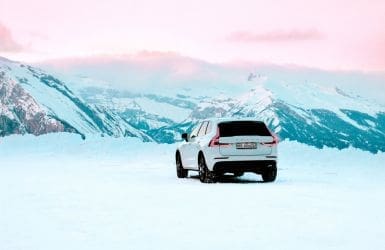
Ken jij de laatste regels rondom winterbanden en sneeuwkettingen?
Koude winters worden in Nederland steeds zeldzamer. Sneeuw en ijzel lijken minder vaak voor te komen, waardoor niet iedere automobilist zijn zomerbanden omwisselt voor winterbanden zodra het seizoen begint. In Nederland zijn winterbanden ook niet verplicht. Ga je met de auto op wintersport? Dan zijn winterbanden misschien wel nodig, want in elk land gelden er weer andere regels. Om te zorgen dat je goed voorbereid op reis gaat hebben we hieronder de regels omtrent winterbanden en sneeuwkettingen in de meest populaire wintersportbestemmingen voor je verzameld.
De verschillende regels per land
Met zomerbanden heeft je auto minder grip en is de remweg langer. Hierdoor loop je zonder winterbanden in winterse omstandigheden een groter risico op een ongeluk. Daarom zijn in sommige landen winterbanden verplicht. In het schema hieronder zie je per land wat de regels zijn. Kijk niet alleen naar de regels in het land van bestemming, maar ook naar die in de landen waar je doorheen reist!
België
Winterbanden
Niet verplicht
Sneeuwkettingen
Alleen toegestaan als de wegen zijn bedekt met sneeuw of ijs.
Duitsland
Winterbanden
Verplicht bij winterse omstandigheden.
Sneeuwkettingen
Verplicht als dit wordt aangegeven met een bord.
Frankrijk
Winterbanden
Verplicht in de winterperiode (van 1-11 t/m 31-3) in bepaalde zones. Dit wordt aangegeven met een bord.
Sneeuwkettingen
Verplicht in de winterperiode in bepaalde zones. Dit wordt aangegeven met een bord.
Italië
Winterbanden
Verplicht in de winterperiode (van 15-11 t/m 15-4) in bepaalde gebieden en op bepaalde wegen, tenzij er sneeuwkettingen aanwezig zijn. Dit wordt aangegeven met een bord. In de Aostavallei geldt wel een algemene verplichting voor winterbanden.
Sneeuwkettingen
Verplicht in de winterperiode (van 15-11 tot 15-4).
Luxemburg
Winterbanden
Verplicht bij winterse omstandigheden.
Sneeuwkettingen
Alleen toegestaan als de weg is bedekt met sneeuw of ijs.
Nederland
Winterbanden
Niet verplicht.
Sneeuwkettingen
Verboden.
Oostenrijk
Winterbanden
Verplicht in winterperiode (van 1-11 t/m 15-4) bij winterse omstandigheden.
Sneeuwkettingen
Verplicht als dit wordt aangegeven met een bord en de weg bedekt is met sneeuw of ijs.
Zwitserland
Winterbanden
Niet verplicht, maar wordt wel aangeraden omdat je een boete riskeert wanneer je hinder veroorzaakt door het gebruik van banden met te weinig grip.
Sneeuwkettingen
Verplicht als dit wordt aangegeven met een bord en de weg bedekt is met sneeuw of ijs.
Winterbanden, zomerbanden of 4-seizoenenbanden?
Naast winterbanden en zomerbanden bestaan er ook 4-seizoenenbanden. Met 4-seizoenenbanden, ook wel all-seasonbanden genoemd, kun je het hele jaar rijden. Het grote voordeel van deze banden is dat je ze niet hoeft te verwisselen. Omdat de 4-seizoenen banden de eigenschappen van zomer- en winterbanden combineren, zijn ze niet te vergelijken met winterbanden.
In Nederland kun je de 4-seizoenenbanden prima gebruiken, maar als je met de auto op wintersport gaat zijn winterbanden sowieso een must. Op besneeuwde wegen hebben winterbanden namelijk meer grip dan 4-seizoenenbanden.
Let op, hebben je 4-seizoenenbanden een symbool met een sneeuwvlokje en is de profieldiepte minimaal 4mm? Dan zijn ze officieel goedgekeurd als winterbanden en kan je ze dus ook gebruiken om mee op wintersport te gaan.
Ben ik wel verzekerd zonder winterbanden?
In Nederland en België zijn winterbanden niet verplicht. Daarom heeft dit geen gevolgen voor aansprakelijkheidsschade en gelden gewoon de regels van je normale dekking.
In landen waar winterbanden wel verplicht zijn, kun je als bestuurder van de auto zonder winterbanden aansprakelijk gesteld worden als je onder winterse omstandigheden een ongeluk veroorzaakt. Dit kan betekenen dat je (een groter deel van je) eigen schade of dat van de tegenpartij zelf moet betalen.
Ook riskeer je in sommige landen, zoals Zwitserland, een boete als je hinder veroorzaakt op de weg door gebruik van banden met onvoldoende grip, ook al worden winterbanden hier enkel aangeraden en zijn ze niet verplicht.
Nooit onderverzekerd
Stel zelf je pakket samen
Een breed aanbod
Wij vergelijken alle verzekeraars voor jou, scheelt weer tijd
Hulp van onze experts
Kom je er niet uit? Onze experts staan altijd klaar om je te helpen
Expert Autoverzekering
We zijn bereikbaar via chat, WhatsApp, telefoon of e-mail
Vragen? Neem contact met ons op als je meer wilt weten.
Wij zijn er vandaag tot 18:00.




